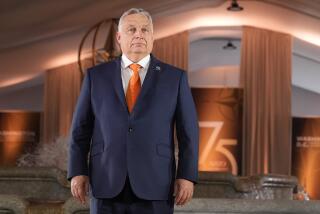Analysis : Allies Shun Reagan’s Reykjavik Goal to Rid the World of Nuclear Weapons
- Share via
BRUSSELS — President Reagan’s NATO allies endorsed his plans for a spring summit meeting in Moscow on Thursday, but they clearly distanced themselves from the sort of rid-the-world-of-nuclear-weapons rhetoric that marked the President’s earlier meetings with Soviet leader Mikhail S. Gorbachev.
The leaders of the 16 nations of the North Atlantic Treaty Organization outlined a generally hard-line approach to East-West relations that is intended to last well beyond the end of Reagan’s term next Jan. 20.
When Reagan and Gorbachev talked about an eventual ban on all nuclear weapons during their 1986 summit session in Reykjavik, Iceland, it sent shock waves through the alliance. Ever since, European members of NATO have been trying to make sure that Reagan’s hopes are not fulfilled.
Although they seldom talk about it in public, most European leaders are far more concerned about the possibility of a war fought with conventional weapons than they are about nuclear war. Although they agree that a nuclear conflict would be far more devastating, the Europeans think that such a war will never be fought. If nuclear arms are removed, many of them fear, a conventional war might break out.
“By maintaining credible deterrence, the alliance has secured peace in Europe for nearly 40 years,” the NATO chiefs said in their final Brussels summit communique. “Conventional defenses alone cannot ensure this.”
The communique added, “For the foreseeable future, there is no alternative to the alliance strategy . . . of deterrence based upon an appropriate mix of adequate and effective nuclear and conventional forces.”
Secretary of State George P. Shultz said following the NATO meeting that the United States will heed the alliance’s advice to move “carefully and deliberately” on nuclear arms control.
“You don’t want to make the world safe for conventional warfare,” he said.
In the next-to-last paragraph of the communique, the NATO leaders expressed “hope” that Reagan’s next meeting with Gorbachev, expected to be held in Moscow in May or June, “will be able to build on the progress they achieved at their Washington meeting last December.
“We strongly support the efforts of the United States,” the communique said.
Reagan was afforded the deference that goes with being the leader of the alliance’s strongest member. For instance, during a largely ceremonial session Thursday morning, Reagan was called on to make the final speech, in effect summing up the meeting.
However, Reagan did most of his talking during closed sessions of the summit. He made a brief public statement at the end of the conference, but he left it to Shultz to respond to reporters’ questions.
The President did not dominate this session the way he did the last NATO summit in 1982. And the alliance seems to be pointing toward the post-Reagan era.
The summit also called for renewed East-West talks on controlling conventional arms, outlining a process that could take many years to complete.
Gorbachev has acknowledged that a conventional arms control agreement would require the Soviet-led Warsaw Pact to make deeper cuts than NATO because the East enjoys a substantial lead in conventional weaponry. But the NATO summit communique said the alliance will insist that the conventional arms negotiations focus on weapons that could be used for a surprise attack--mostly tanks and long-range artillery.
The Warsaw Pact, which has a huge lead in these systems, may not agree that they are much more dangerous than other weapons in which the imbalance is much less.
More to Read
Sign up for Essential California
The most important California stories and recommendations in your inbox every morning.
You may occasionally receive promotional content from the Los Angeles Times.













